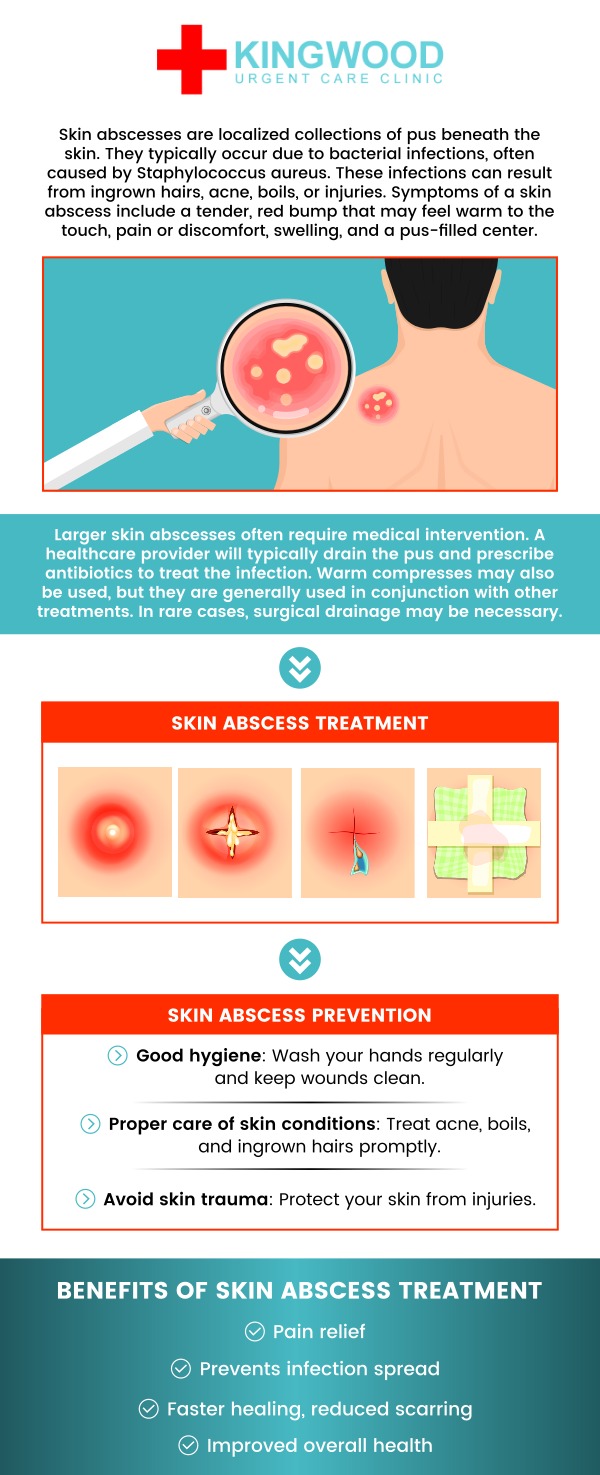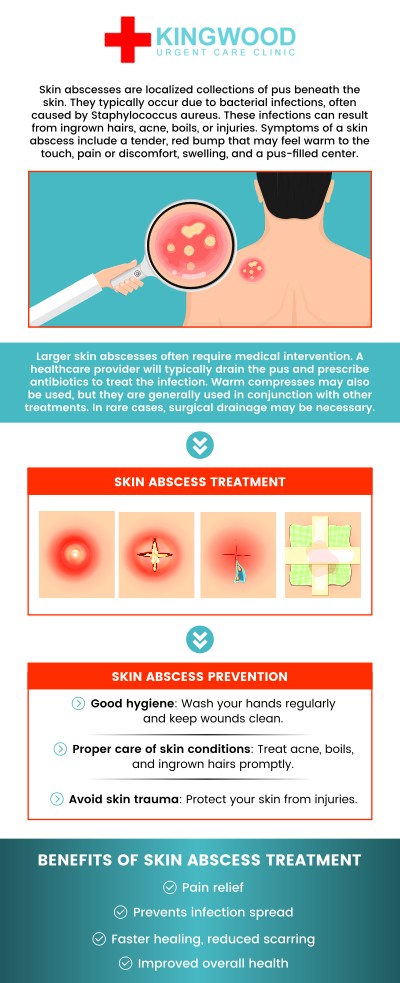Abscesses Treatment in Kingwood TX
Abscesses are pus pockets that can develop anywhere on your body. Skin abscesses are relatively common. Consult our doctors at Kingwood Urgent Care Clinic if you have any signs of an abscess that hasn’t healed on its own. They can examine your abscess and offer comprehensive treatment for it. For more information, contact us at your earliest convenience or visit us online to see our business hours. We also accept walk-ins. Our clinic is conveniently located at 2601 W Lake Houston Pkwy Kingwood, TX.




Table of Contents:
What causes an abscess?
What are the signs an abscess has spread?
Is there a difference between an abscess and cellulitis?
How do you treat abscesses?
Most abscesses of the skin occur due to a bacterial infection (commonly called staphylococcus) entering the skin. The immune system responds by sending white blood cells to the infected area to kill the bacteria. The tissue around the infection dies, creating a void that fills with pus, which then creates the visible abscess. An abscess on the skin will appear as tender, pink, deep red, and a painful mass that is easy to feel and is warm to the touch. An abscess can appear anywhere on the body, and the most common sites are the armpits, around the anus or vagina, the base of the spine, the groin area, as well as a tooth (dental abscess). Sweat or oil glands can become obstructed (sebaceous), a pre-existing cyst or a hair follicle are also triggers for an abscess to form. Pressure and inflammation are what cause the pain from an abscess. The abscess contains a fluid of dead cells and bacteria, which creates tension under the skin, causing further inflammation of the tissue surrounding the abscess. Those with compromised immune systems are at greater risk of developing certain types of abscesses, because of the body’s decreased ability to fight off infections. Other common risk factors that increase the likelihood of developing an abscess include exposure to people with skin infections, dirty environments, poor hygiene, and poor circulation.
The first indicator the abscess may be spreading is visible red streaks emanating from the infected area. In addition to red streaks leading away from the abscess, another sign the infection is spreading are tender lymph nodes, which appear as lumps between the abscess and the chest, along with a fever that exceeds 102° F. If any of these signs of spreading are observed, a visit to urgent care is warranted.
Both cellulitis and abscesses are among the most common soft-tissue and skin infections, and misdiagnosis is common. Cellulitis occurs when bacteria is able to get under the skin, usually from a cut or scrape, or insect bite, resulting in a type of rash called erythema, that can spread rapidly, ranging from mild to life-threatening. Abscesses on the other hand appear as a large, pus-filled, boil beneath the skin, and can manifest from different types of infections. An abscess may occur with symptoms similar to cellulitis, though they are not the same. Though it is possible to have both an abscess and cellulitis at the same time.
Cellulitis symptoms include:
– Fatigue
– Chills and fever
– Lightheadedness, dizzy when standing
– Spreading redness of the skin, painful, swollen and may blister and scab
– Shaking and sweating
– Lymph node and gland swelling
A skin abscess could display the following symptoms:
– Chills and fever
– Swelling under the skin
– Red, tender, and warm to the touch around the affected area
– Yellow or white pus under the skin
An abscess is usually treated effectively by your doctor draining the fluid from the abscess, however, antibiotics may also be necessary when the abscess is caused by a bacterial infection. Your doctor may use a local anesthetic to numb the area, then cover the area with an antiseptic solution and sterile towels. The doctor may then create a small incision to drain the fluid from the abscess. Finally, your doctor may bandage the incision area, allowing the abscess to heal, and may likely provide oral antibiotics.
At Kingwood Urgent Care, our highly skilled team of primary care, ER and family care physicians take great pride in providing our community with the professional, compassionate, and effective care you deserve. We also help treat abscesses, so contact us today. Call our clinic for an appointment. We also accept walk-ins for urgent care. Directions to Kingwood Urgent Care can be found on our website and we look forward to seeing you soon. We serve patients from Kingwood TX, Huffman TX, Atascocita TX, Humble TX, Porter TX, New Caney TX, Houston TX, Crosby TX, Dayton TX, Mont Belvieu TX and Spring TX.






